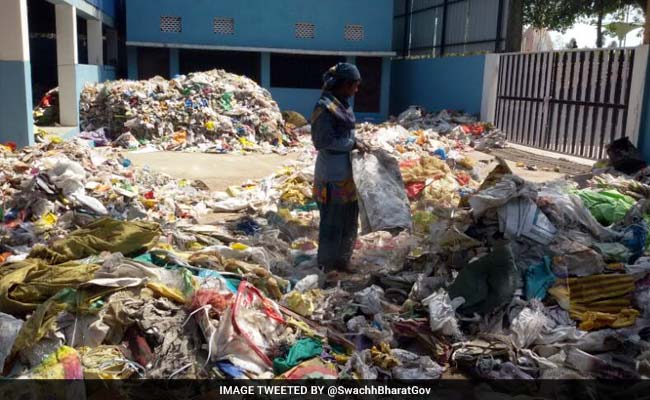Highlights
- The rag pickers segregate and sell plastic that can be recycled
- Purified plastic is sent to Road Development Authority to construct roads
- The city generates nearly 13,000 kilos of plastic waste daily
Until a few months ago, Indore, Madhya Pradesh’s most populous city, was almost choking on its plastic waste. The city generates nearly 50,000 kilos of municipal waste every day, 13,000 kilos of which is plastic waste. Plastic is non-biodegradable and much of it is difficult to recycle. The city used to dispose its daily plastic waste, all 13,000 kilos of it, by burning it. Just five months ago, the city was almost choking in smog caused due to the burning of such large amounts of plastic.
This is when the Indore Municipal Corporation (IMC) decided to change its strategy and overturn the despicable state of Indore’s plastic waste. In January this year they set up a Plastic Collection Centre (PCC) to reuse and recycle the city’s plastic waste.
The results were almost instantaneous. On April 11, a mere 4 months into the new system, the Madhya Pradesh Pollution Control Board (MPPCB) declared that the pollution levels of the city had fallen from 140 microgram per cubic-metre to 80 microgram per cubic-metre. The good news is that Indore’s pollution levels have come close to the safety limit which is 60 microgram per cubic metre as prescribed by the National Ambient Air Quality Standards of the Central Pollution Control Board.
Also Read: This Kolkata School Sets A Trend, Reuses And Recycles All Waste, Recycled
Solving the problem of Plastic Disposal
Plastic polythene is difficult to recycle and there was no way we could dispose it off without harming the environment, says Imtiaz Ali, Director of Sarthak, an NGO that handles more than half of the city’s plastic waste.
The Indore Municipal Corporation, along with some NGOs, has come up with scientific ways to recycle plastic waste. Along with setting up a plastic collection centre, the IMC also installed a plastic cleansing machine known as a ‘Phatka Machine.’
Handling of Plastic Waste
First, the rag pickers segregate and sell plastic that can be recycled. The remaining plastic is taken to the PCC where it goes through the process of shredding and purification. The shredded waste is then bundled in blocks of 100 kilos and carried to the cement plants, where it is used as a fuel for boilers.
Some of the shredded and purified plastic is also sent to Madhya Pradesh Rural Road Development Authority for road construction.
“Plastic being a petroleum product is mixed with coal tar, reducing the proportion of tar by 15%. The mixture is environmental friendly and it has also proved to be cost effective,” said Asad Warsi, a Swachh Bharat Mission Consultant with the IMC. “Since the construction of PCC, nearly 45,000 kilos of plastic waste is recycled and reused per day,” added Mr Warsi.
The NGOs involved in the segregation process have been instrumental in teaching people ways to segregate waste and are in the process of imbibing the values of swachhta in the citizens of Indore.
Social workers educate and train people to segregate waste when they accompany municipal workers in their morning routine of door-to-door waste collection once every week, adds Gopal Jagtap, Head of Solid Waste Management and Sanitation at BASIX, a non-profit organisation.
From being labelled as the biggest plastic waste generator in Madhya Pradesh in 2013, to putting 50% of city’s plastic waste to reuse in 2017, Indore is a shining example to other big cities in India grappling with waste management woes.
Also Read: Plastic Ban: What India Can Learn From Other Countries




























